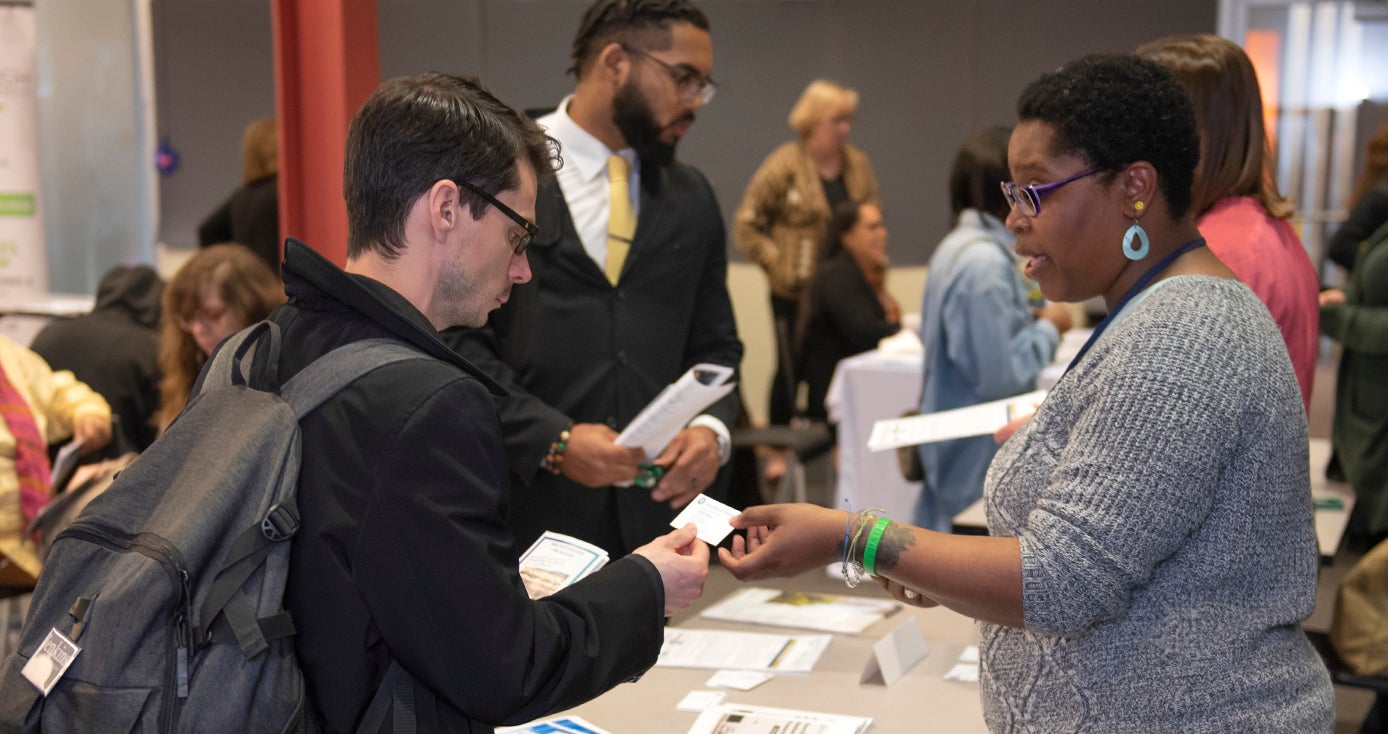
Subscribe to Pittwire Today
Get the most interesting and important stories from the University of Pittsburgh.Librarian Helps Aspiring Entrepreneurs Clear Pathways to Their New Ventures
A meeting room at the Squirrel Hill branch of Carnegie Library hummed with activity, attracting community members to a Small Business Resource Fair where LaMonica Wiggins stood ready to help.
Wiggins, the new entrepreneurship librarian at Pitt’s University Library System, helmed a table at the Urban Redevelopment Authority-sponsored fair. The outreach is part of her role at Pitt, which involves working closely with entrepreneurs exploring new business ventures and assisting them in conducting industry, company and market research to support their ideas.
“There’s a lot of information out there, but it’s not all in one neat package,” said Wiggins. “Entrepreneurs often need to use a combination of resources to get a clearer picture of what's going on.”
Learn more
The University Library System’s entrepreneurship page provides details and links to the library’s resources on starting a business.
Use the interactive online scheduler to make an appointment with LaMonica Wiggins at the Business Research Clinic.
At the fair, Wiggins explained her services to those who stopped by to chat. One such service, the Business Research Clinic, is a free confidential one-hour consultation for members of the Pittsburgh community. During sessions, frequently conducted in her Hillman Library office, she helps clients understand the structure and dissemination of business information and teaches them how to use a variety of research resources and tools.
It’s a world that comes easily to her, she said, because her mother, a former dean of libraries at Broward College, instilled a love of librarianship in her from the time she was a young girl. Eventually, armed with a Pitt master’s degree in library and information science, Wiggins started her career in 2013 as a business librarian at the Carnegie Library’s busy Downtown branch. There, she taught business and technology courses to the public and built relationships with local government to design programming and services for Pittsburgh-based entrepreneurs. She further honed her skills as the entrepreneurship librarian at Pennsylvania State University before arriving at Pitt just a few months ago.
“Most of the people I work with have no formal business training,” she said. "But they do have a passion for their work.”
Entrepreneur Jeremy Burnworth stopped by the table to get Wiggins’ input on his idea — an incubator specifically for people emerging from the criminal justice system who want to start a business. Wiggins and Burnworth discussed some the unique challenges that people with criminal backgrounds face, including a lack of access to traditional capital and a social stigma. Wiggins shared her expertise, agreeing that this type of service would be crucial in helping to decrease rates of recidivism among that population.
Entrepreneur Michelle C., who asked that her last name not be used because she is not yet ready for clients, booked a one-hour consultation with Wiggins on campus. Her concept is a stand-alone business that offers micro-loans for entrepreneurs in underserved neighborhoods. She said Wiggins pulled up websites for her and showed her how to navigate them. “It was a very one-on-one deep dive into just what I was looking for,” she said. “Not just, ‘Here’s a list of links. Good luck.’”
Michelle was also pleasantly surprised by a follow-up email from Wiggins, who offered to help her again further along on her journey, if needed.
Wiggins said she talked to about 25 people at the Squirrel Hill event and she listened to ideas ranging from spas to jewelry stores to ideas like Burnworth's. Most of the people she spoke to were women or minorities, which she found encouraging, she said, because they are populations for whom she had developed outreach programs over the years.
Wiggins also works with faculty and students on campus, supporting the entrepreneurship curriculums and co-curricular activities such as the Randall Family Big Idea Competition and Pitt Small Business Development Center.
To entrepreneurs, Wiggins offered this important tip: “Although researching your potential market is crucial in the beginning stages of your startup, it can only get you so far. Whether developing an emerging or transformative product or tapping into an established industry, talking to your customers and staying in tune with their needs and wants can help propel your idea into a potentially viable business.”


